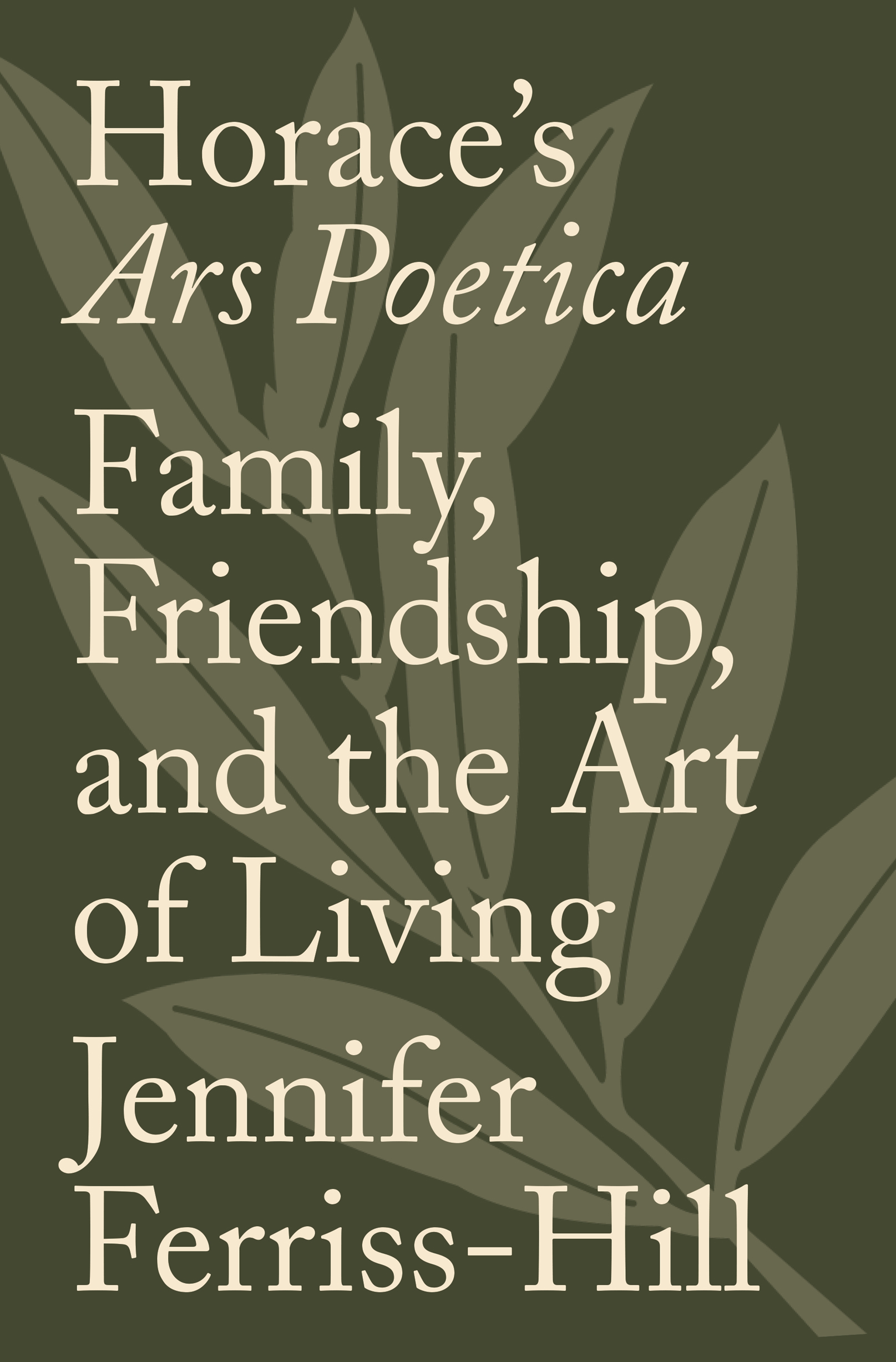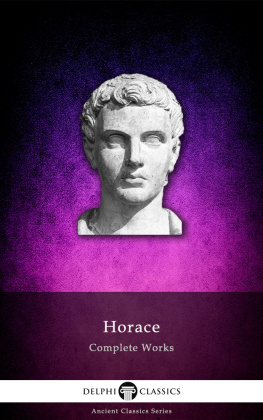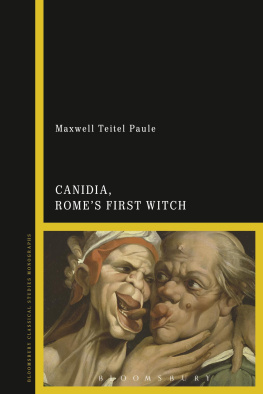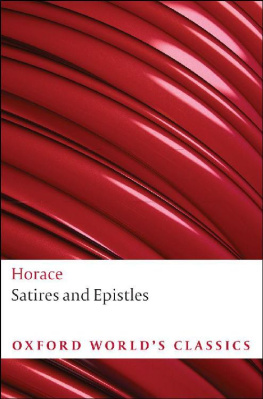Jennifer Ferriss-Hill - Horaces Ars Poetica
Here you can read online Jennifer Ferriss-Hill - Horaces Ars Poetica full text of the book (entire story) in english for free. Download pdf and epub, get meaning, cover and reviews about this ebook. year: 2019, publisher: Princeton University Press, genre: Detective and thriller. Description of the work, (preface) as well as reviews are available. Best literature library LitArk.com created for fans of good reading and offers a wide selection of genres:
Romance novel
Science fiction
Adventure
Detective
Science
History
Home and family
Prose
Art
Politics
Computer
Non-fiction
Religion
Business
Children
Humor
Choose a favorite category and find really read worthwhile books. Enjoy immersion in the world of imagination, feel the emotions of the characters or learn something new for yourself, make an fascinating discovery.

- Book:Horaces Ars Poetica
- Author:
- Publisher:Princeton University Press
- Genre:
- Year:2019
- Rating:3 / 5
- Favourites:Add to favourites
- Your mark:
- 60
- 1
- 2
- 3
- 4
- 5
Horaces Ars Poetica: summary, description and annotation
We offer to read an annotation, description, summary or preface (depends on what the author of the book "Horaces Ars Poetica" wrote himself). If you haven't found the necessary information about the book — write in the comments, we will try to find it.
Horaces Ars Poetica — read online for free the complete book (whole text) full work
Below is the text of the book, divided by pages. System saving the place of the last page read, allows you to conveniently read the book "Horaces Ars Poetica" online for free, without having to search again every time where you left off. Put a bookmark, and you can go to the page where you finished reading at any time.
Font size:
Interval:
Bookmark:

HORACES ARS POETICA
Horaces Ars Poetica
FAMILY, FRIENDSHIP, AND THE ART OF LIVING
JENNIFER FERRISS-HILL
PRINCETON UNIVERSITY PRESS
PRINCETON & OXFORD
Copyright 2019 by Princeton University Press
Published by Princeton University Press
41 William Street, Princeton, New Jersey 08540
6 Oxford Street, Woodstock, Oxfordshire OX20 1TR
press.princeton.edu
All Rights Reserved

Princeton University Press gratefully acknowledges the assistance of the National Endowment for the Humanities in support of publication of this book. Any views, findings, conclusions, or recommendations expressed in this book do not necessarily represent those of the National Endowment for the Humanities.
ISBN 9780691195025
eISBN 9780691197432
Version 1.0
LCCN 2019944690
Editorial: Rob Tempio and Matt Rohal
Production Editorial: Debbie Tegarden
Jacket/Cover Design: Layla Mac Rory
Production: Merli Guerra
Publicity: Alyssa Sanford
Copyeditor: Aimee Anderson
For Robert, Beatrice, and Julian, again.
- ix
- xi
Nonumque prematur in annum / membranis intus positis
( AP 38889)
WHILE THESE lines from the Ars Poetica might well be used to preface any work, in particular one devoted wholly to the poem, they are particularly apt in the present case since I almost wrote my PhD dissertation on the Ars Poetica. The problem, however, was that I had not quite figured out what to say about the work, though I found it intriguing. It took writing my dissertation and first book on Old Comedy and Roman Satire (Roman Satire and the Old Comic Tradition, Cambridge University Press, 2015) for the arguments and readings presented here to begin to coalesce. The present project has accordingly undergone a long gestationone that exceeds even Horaces recommended nine years. Throughout these years I have been fortunate to enjoy the support and wise counsel of many friends and colleagues who have variously attended talks, corresponded by email, offered their expertise (especially on the reception of the Ars Poetica in later periods), recommended further readings and avenues of exploration, and graciously read portions of the manuscript: Jafari Allen, David Armstrong, Jaswinder Bolina, Ava Brillat, Anne Cruz, Caleb Dance, Mike Fontaine, Ernesto Fundora, Aaron Kachuck, Rebecca Katz, John Kirby, Jeanne Neumann, Sarah Nooter, Bijan Omrani, Frank Palmeri, John Paul Russo, Wilson Shearin, Mihoko Suzuki, Hugh Thomas, Richard Thomas, Han Tran, and Robyn Walsh. To all these and more I owe an inexpressibly huge debt of gratitude. It goes without saying that any remaining errors are entirely my own responsibility.
I am also grateful to Joshua Katz for encouraging me to pursue publication with Princeton University Press, where I was fortunate to work with Jessica Yao and Rob Tempio. Jessica was a model editor, encouraging and involved in every detail from the start while also seeing the book through two rigorous rounds of review; Rob Tempio expertly shepherded the book through to completion, with Matt Rohal and Debbie Tegarden. The anonymous readers selected by the press were exceptionally helpful, and this book would be far weaker were it not for their suggestions. I have conveyed my thanks to them several times already and am pleased to be able to do so here again. I could not have hoped for a better editorial team and process.
This project has been generously funded by the National Endowment for the Humanities through a summer stipend, and by the University of Miami in the form of two Provost Research Awards, a sabbatical leave, and a semester of associate professor post-tenure teaching release. I am also grateful to all in attendance on those occasions at which I presented portions of the project: several meetings of both the Classical Association of the Middle-West and South and the Antiquities Interdisciplinary Research Group convened at the Center for the Humanities at the University of Miami.
Finally, to my family: thank you for indulging me once again as I wrote another book; I hope that I have gotten at least a little better at doing it without causing undue disruption to everyone around me.
THE FULL Latin text of Horaces Ars Poetica (from Shackleton Baileys 2001 edition, except where indicated) appears on pages xiixli. The original text is on the left-hand pages and my own translation appears on the right. Readers less familiar with the poem will want to begin by reading it in its entirety; others may find it useful to refer back to this translation as needed. In addition to offering readability of a fairly literal sort, the translation aims to reflect the reading of the poem offered in the present study.
Humano capiti cervicem pictor equinam
iungere si velit et varias inducere plumas
undique collatis membris, ut turpiter atrum
desinat in piscem mulier formosa superne,
spectatum admissi risum teneatis, amici? |
credite, Pisones, isti tabulae fore librum
persimilem cuius, velut aegri somnia, vanae
fingentur species, ut nec pes nec caput uni
reddatur formae. pictoribus atque poetis
quidlibet audendi semper fuit aequa potestas. |
scimus, et hanc veniam petimusque damusque vicissim;
sed non ut placidis coeant immitia, non ut
serpentes avibus geminentur, tigribus agni.
inceptis gravibus plerumque et magna professis
purpureus, late qui splendeat, unus et alter |
assuitur pannus, cum lucus et ara Dianae
et properantis aquae per amoenos ambitus agros,
aut flumen Rhenum aut pluvius describitur arcus.
sed nunc non erat his locus. et fortasse cupressum
scis simulare: quid hoc, si fractis enatat exspes |
navibus aere dato qui pingitur? amphora coepit
institui: currente rota cur urceus exit?
denique sit quidvis, simplex dumtaxat et unum.
maxima pars vatum, pater et iuvenes patre digni,
decipimur specie recti. brevis esse laboro, |
obscurus fio; sectantem levia nervi
deficiunt animique; professus grandia turget;
serpit humi tutus nimium timidusque procellae.
qui variare cupit rem prodigialiter unam,
delphinum silvis appingit, fluctibus aprum: |
in vitium ducit culpae fuga, si caret arte.
Aemilium circa Ludum faber unus et unguis
exprimet et mollis imitabitur aere capillos,
infelix operis summa, quia ponere totum
nesciet. hunc ego me, si quid componere curem, |
non magis esse velim quam naso vivere pravo,
spectandum nigris oculis nigroque capillo.
sumite materiam vestris, qui scribitis, aequam
viribus et versate diu quid ferre recusent,
quid valeant umeri; cui lecta pudenter erit res, |
nec facundia deseret hunc nec lucidus ordo.
ordinis haec virtus erit et Venus, aut ego fallor,
ut iam nunc dicat iam nunc debentia dici,
pleraque differat et praesens in tempus omittat.
hoc amet, hoc spernat promissi carminis auctor. |
Font size:
Interval:
Bookmark:
Similar books «Horaces Ars Poetica»
Look at similar books to Horaces Ars Poetica. We have selected literature similar in name and meaning in the hope of providing readers with more options to find new, interesting, not yet read works.
Discussion, reviews of the book Horaces Ars Poetica and just readers' own opinions. Leave your comments, write what you think about the work, its meaning or the main characters. Specify what exactly you liked and what you didn't like, and why you think so.






